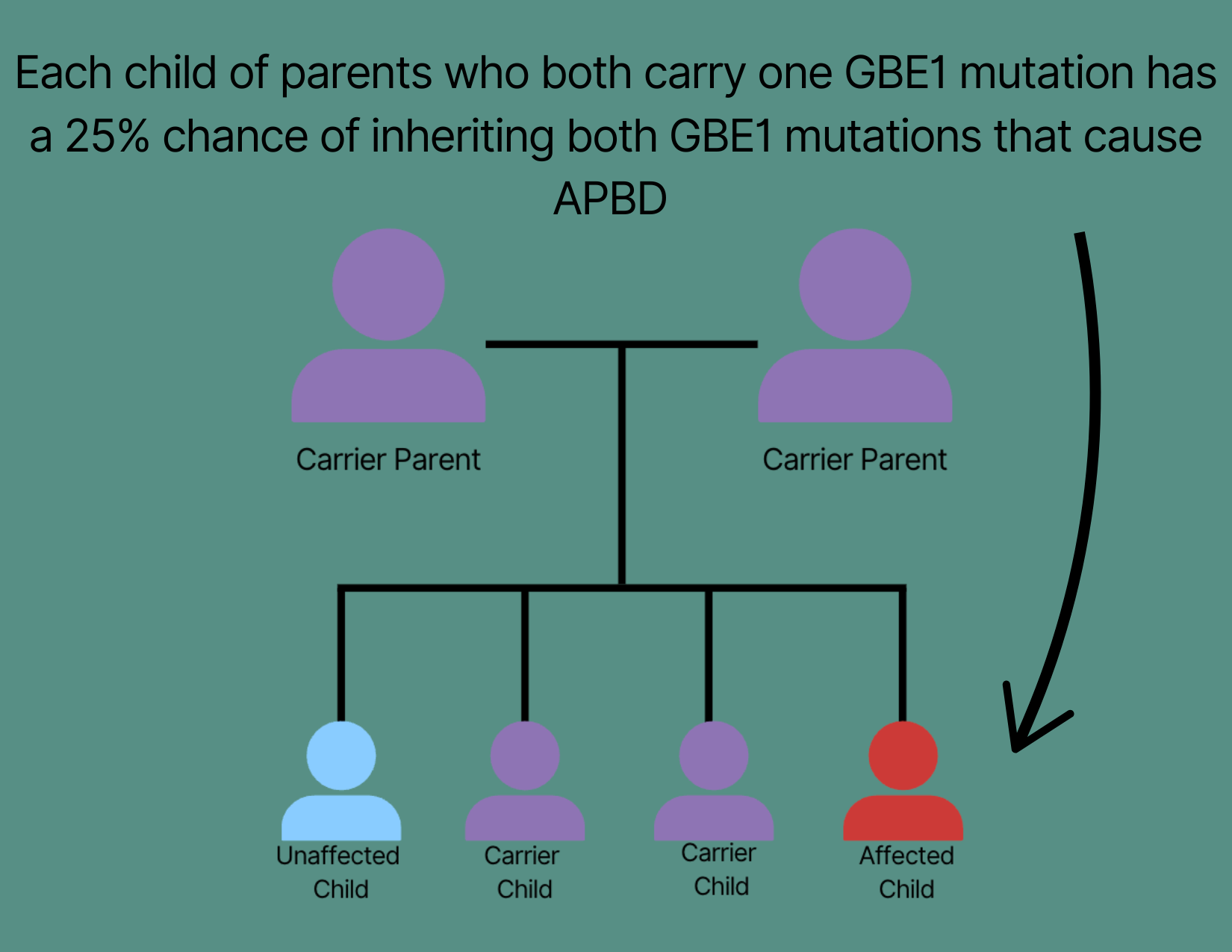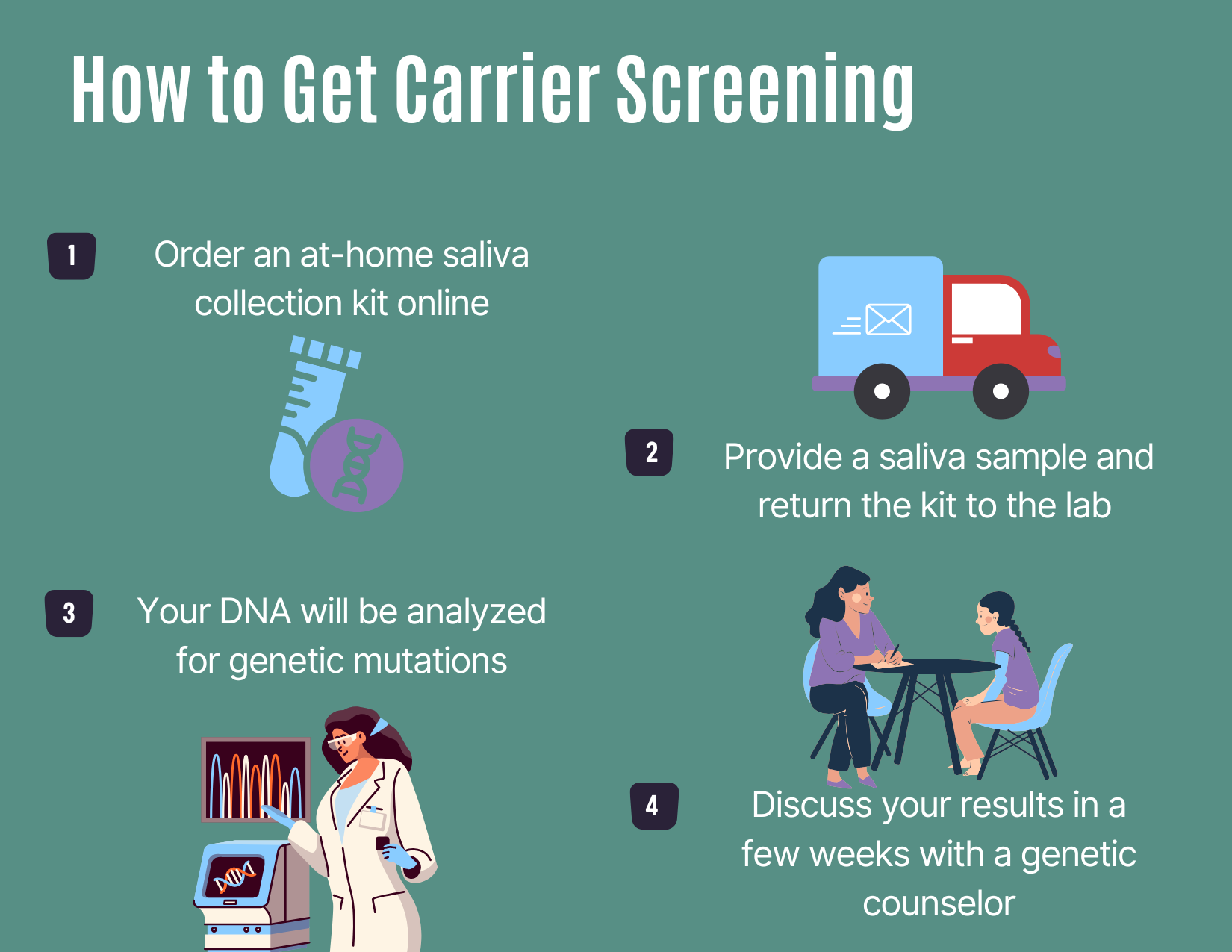Decoding APBD Inheritance: A Guide to Carrier Screening and Family Planning
Editor’s Note: Our Scientific & Research Coordinator, Becca Reef, and 2024/2025 Genetic Counseling Intern, Liv Palma, teamed up to write this article. They explore the genetics of APBD, including what it means to be a carrier and the importance of carrier screening. This is the first in a two-part series focused on the genetics and diagnosis of APBD, providing valuable information for patients, families, and healthcare professionals alike.
Understanding the Genetics of APBD
What is the inheritance pattern?
We all inherit two copies of each gene – one from each parent. For a person to have APBD, they must inherit two mutated (non-working) copies of the GBE1 gene. This pattern of inheritance is called autosomal recessive inheritance.

What is a carrier?
A carrier has one normal copy and one non-working copy of the GBE1 gene. While carriers do not have APBD themselves, they can pass the non-working gene on to their children. If both parents are carriers, there is a 25% (1 in 4) chance in each pregnancy that their child will inherit both non-working copies of the gene and develop APBD.
Q: If only one parent is a carrier, can a child still get APBD?
A: Both parents must be carriers for a child to inherit two copies of the non-working gene. If only one parent is a carrier, children may inherit one non-working copy and be carriers themselves but will not develop APBD.
Q: Is it possible to be a carrier and never know it?
A: Yes. Carriers of APBD aren’t known to have symptoms. Genetic testing is the only way to know for sure if you are a carrier before you have children.
What is Carrier Screening?
Carrier screening is a genetic test that identifies whether an individual carries a mutation in a gene associated with a condition such as APBD.
Screening helps individuals and couples understand their chance of having a child with a genetic condition. Knowing your carrier status can empower you to make informed health decisions, consider family planning options, and understand potential risks for future generations. In the case of most inherited autosomal recessive conditions, there is usually no prior family history of the disease.
Who should consider getting this test?
Carrier screening is ideal for people who are planning to start or grow their family and want to know their chance of having a child with a genetic condition.
Either carrier screening or targeted genetic testing for APBD is especially important for those with a family member diagnosed with APBD. Since APBD is diagnosed more commonly in individuals of Ashkenazi Jewish descent, carrier screening may be particularly valuable for people from this background.
When should carrier screening be done?
Carrier screening is ideally performed before pregnancy, providing more time to make informed family planning decisions. However, if this isn’t possible, it can still be ordered during pregnancy.
What kinds of carrier screening are available?
If you’re planning a pregnancy or are already pregnant, carrier screening is an essential option to consider. Expanded carrier screening, which evaluates a broad spectrum of genetic conditions, is now widely accessible. This comprehensive testing can identify risks for rare conditions that might otherwise be overlooked, regardless of family history or ethnic background. By offering a more inclusive approach, it enables you to better prepare emotionally and practically for your pregnancy.
You can consult with your healthcare provider to explore testing options that align with your personal values and family planning goals.
Q: I have a relative with APBD. Should I get carrier screening or a different kind of genetic test?
A: If you have a relative with APBD, in-depth genetic testing of the GBE1 gene may be more appropriate. Be sure to share your relative’s lab report with your healthcare provider or genetic counselor to help identify the specific genetic change in your family and ensure the appropriate testing is ordered.
Visit the video above to hear Karen Grinzaid, MS, CGC, CCRC of JScreen discuss the importance of carrier screening at our 2024 APBD Scientific & Community Conference.
How To Access Carrier Screening
How do I get this test?
Carrier screening can be simple and accessible. See below for several options that include the GBE1 gene, although keep in mind this list is not all inclusive. You may be able to order carrier screening through your personal healthcare provider, or a local genetic counselor.
- Comprehensive Expanded Carrier Screening through JScreen, covering more than 260 conditions
- Universal Plus Expanded Carrier Screening Panel through Myriad Genetics, covering 267 conditions
- Inheritest 300+ or 500+ Carrier Screening Panel through LabCorp, covering 300-500+ conditions

Managing Results
If you’re found to be a carrier for APBD, it’s recommended that your partner also get tested. This helps both of you understand your chances of having a child affected by the condition and explore your options.
If both partners are carriers for APBD, there’s a 1 in 4 (25%) chance that a future pregnancy will be affected by it. Speaking with a genetic counselor can help you both understand what this means for your family planning and guide you through your options.
What are my options if both my partner and I are carriers for APBD?
If carrier screening identifies you as a carrier couple for a genetic condition, you have several options to consider:
- Pregnancy with Prenatal Testing: You can proceed with a pregnancy and pursue prenatal diagnostic tests, through CVS or amniocentesis, to determine if the pregnancy is affected by the condition.
- In Vitro Fertilization (IVF): IVF with preimplantation genetic testing (PGT) allows embryos to be screened for the genetic condition of concern before implantation. Using donor eggs or sperm is another option in this pathway.
- Adoption: You may also choose to grow your family through adoption.
- Postnatal Testing: You may choose to continue the pregnancy and test the baby for the condition after birth, or when appropriate.
Each option has unique considerations, and a healthcare provider or genetic counselor can help guide you in making the decision that’s best for your circumstances and goals.
Q: Carrier screening revealed that I have APBD. I have no symptoms. What do I do now?
A: It can be surprising and concerning to learn this, especially if you were not expecting this news. Start by speaking with your healthcare team to understand your results. The APBD Research Foundation can also provide support and connect you with resources to help advance research and find community.
Date Published: February 2025
Last Update: February 2025
